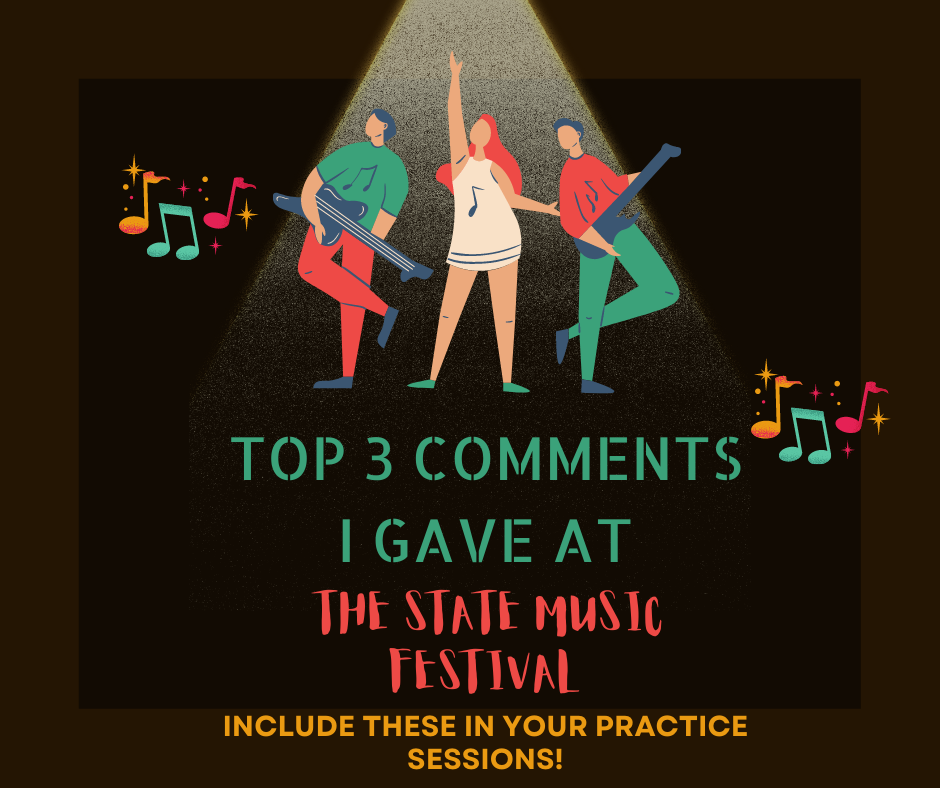
Going into my first year of adjudicating, I wasn’t completely sure what to expect, but music is my life, so I was ready to tackle anything. I was kind of expecting that all the performances would let me dig in and get to talk music on a technical level- cadences, proper chord tuning, alternate positions, etc. And I totally did get to talk to students on a technical level, but I just forgot that I would have to meet them where they were at in their studies. A few Class A’s that I was sending to the next round at state I could definitely get into the nitty gritty, but most students heard the same three comments- Use more air, practice with a metronome, and look at the details of music.
That was it! About 90% of students needed to work on these 3 skills to improve and tackle more difficult and fun music. Below is how I would try to explain it to the students. I wouldn’t say ALL of this, but I would use about two sentences from each category that I thought fit their needs the most.
- Use more air! So many students just wouldn’t use enough air to fill up the horn to produce a good sound. I would remind them that air is the foundation of what we do, and if we do not have enough air, we cannot have correct tempos, dynamics, good tone, articulations, nothing! If I could tell a student was just nervous and was playing softer, I would find two things that I could tell them that they were doing right, remind them of those things, and for the audience to hear how great they sound, they would need to play loud and confident. “Fill up the room with sound! We want to hear you!” And they would smile and feel validated that they are doing well. I would try to identify why they weren’t using enough sound and then tell them why it was important and how they could fix it.
- Use a metronome! As a music teacher, this is probably the number one comment I say to all my students. Every student, every week. Just once I wish a student would be like, “Don’t worry, I’l make sure to use my metronome!” It’ll never happen, but hey, I can dream!! It was also the number 2 comment I gave while judging the solos. In the Class A solos, there are tricky rhythms, compound meter, and specific tempo markings that need to be adhered to. I would tell them that if they just used a metronome, they would be able to hear and feel how the rhythms fit into the music. The Class B and C’s I would remind them that metronomes will keep the tempo steady and help make sure that we don’t play the 8th notes too fast, and it would keep us from rushing the easy sections. Whatever they were struggling with regarding tempo or rhythms I would tell them how to fix it using a metronome.
- Pay attention to the details! The one thing that would keep a student from getting the highest rating was completely ignoring all of the tempos, dynamics, and articulations. If a student wasn’t using enough air, but I could tell they were trying to follow the details, not a big deal, something to work on. Rhythms are difficult for most people and is always a work in progress, so a few mistakes won’t make or break you. But I cannot tell you how many times I would have students play, and they would completely ignore all the details written in. Like absolutely nothing. No dynamic changes, no staccatos, and just completely the wrong tempo. Those details are what makes the music fun to listen to and fun to play! This was more prevalent in Class B and C; the students would just not do anything to play musically. The Class A soloists would pay attention to the details, they would just be afraid to push their limits in the dynamic ranges or make a very clear differentiation between something like staccatos and marcatos, I could tell they were doing it, but they could exaggerate the difference more.
If you are a student yourself or a teacher sending your students to festival, make sure to focus on these three issues when preparing your solos. Having all three of these categories locked down will make you stand out and impress the judges. You’ll be sure to get a great score if you practice, and practice correctly. Happy Practicing! 🎶
Excellent post. I definitely appreciate this website. Thanks!
Absolutely! Glad it is helpful! Come back soon for more info 🙂